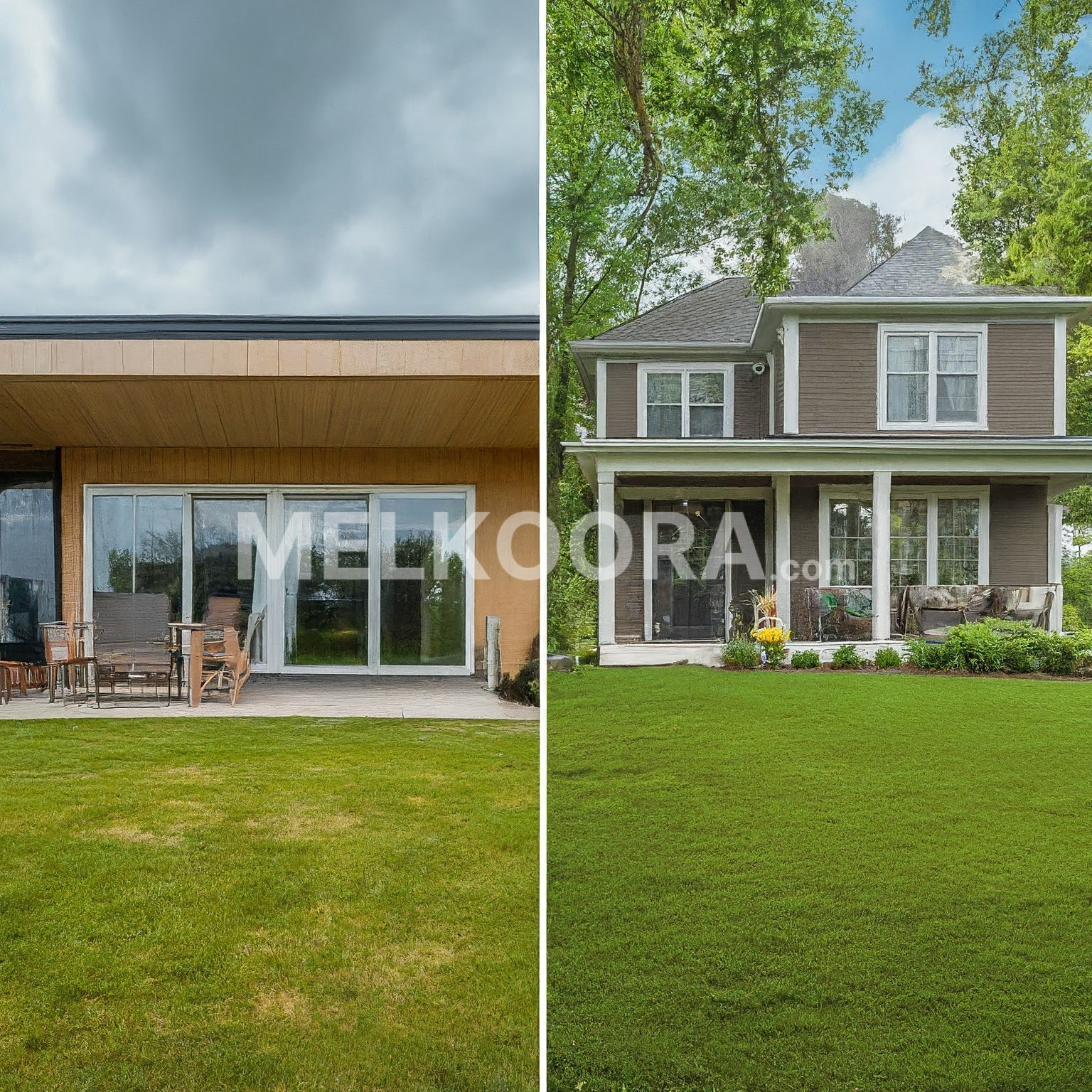Land vs. House: Choosing the Better Investment Option
റിയൽ എസ്റ്റേറ്റ് നിക്ഷേപത്തിൻ്റെ കാര്യത്തിൽ, നിക്ഷേപകർ അഭിമുഖീകരിക്കുന്ന പ്രധാന തീരുമാനങ്ങളിലൊന്ന് ഭൂമിയിലോ വീടോ നിക്ഷേപിക്കണോ എന്നതാണ്. രണ്ട് ഓപ്ഷനുകളും അദ്വിതീയ നേട്ടങ്ങളും പരിഗണനകളും വാഗ്ദാനം ചെയ്യുന്നു, ഒരു തീരുമാനമെടുക്കുന്നതിന് മുമ്പ് ഗുണദോഷങ്ങൾ തീർക്കേണ്ടത് പ്രധാനമാണ്. ഈ ബ്ലോഗ് പോസ്റ്റിൽ, ഏത് ഓപ്ഷനാണ് നിങ്ങൾക്ക് മികച്ച നിക്ഷേപമെന്ന് നിർണ്ണയിക്കാൻ നിങ്ങളെ സഹായിക്കുന്നതിന് ഞങ്ങൾ ഭൂമി, വീട് നിക്ഷേപങ്ങൾ താരതമ്യം ചെയ്യും.
Investing in Land:
- Potential for Appreciation: ഭൂമിക്ക് പൊതുവെ ദീർഘകാല വിലമതിപ്പിന് സാധ്യതയുണ്ട്, പ്രത്യേകിച്ചും അത് ഒരു വികസ്വര പ്രദേശത്താണ് സ്ഥിതി ചെയ്യുന്നതെങ്കിൽ അല്ലെങ്കിൽ പുനർനിർമ്മാണത്തിനോ വികസനത്തിനോ ഉള്ള സാധ്യതയുണ്ടെങ്കിൽ.
- Lower Maintenance Costs: വീടുകളുമായി താരതമ്യപ്പെടുത്തുമ്പോൾ, ഭൂമിക്ക് സാധാരണ പരിപാലനച്ചെലവ് കുറവാണ്, കാരണം പരിപാലിക്കാൻ ഘടനകളൊന്നുമില്ല.
- Flexibility: ഭാവിയിലെ ഉപയോഗത്തിൻ്റെ കാര്യത്തിൽ ഭൂമി കൂടുതൽ വഴക്കം നൽകുന്നു. ഭാവി വികസനത്തിനായി നിക്ഷേപകർക്ക് ഭൂമി കൈവശം വയ്ക്കാം അല്ലെങ്കിൽ വിപണി സാഹചര്യങ്ങൾ അനുകൂലമാകുമ്പോൾ വിൽക്കാം.
- Lack of Income Generation: ഭൂമിയിൽ നിക്ഷേപിക്കുന്നതിൻ്റെ ഒരു പോരായ്മ അത് വാടക വരുമാനം ഉണ്ടാക്കുന്നില്ല എന്നതാണ്. നിക്ഷേപത്തിൽ നിന്നുള്ള വരുമാനം സാക്ഷാത്കരിക്കുന്നതിന് നിക്ഷേപകർ അഭിനന്ദനത്തിനോ വികസന അവസരങ്ങൾക്കോ വേണ്ടി കാത്തിരിക്കേണ്ടി വന്നേക്കാം.
Investing in a House:
- Rental Income: ഒരു വീട്ടിൽ നിക്ഷേപിക്കുന്നതിൻ്റെ ഏറ്റവും വലിയ നേട്ടങ്ങളിലൊന്ന് വാടക വരുമാനത്തിനുള്ള സാധ്യതയാണ്. നിക്ഷേപത്തിന് സ്ഥിരമായ വരുമാനം നൽകിക്കൊണ്ട് വീടുകൾക്ക് ക്രമമായ പണമൊഴുക്ക് സൃഷ്ടിക്കാൻ കഴിയും.
- Appreciation: ഭൂമി പോലെ, വീടുകൾക്കും വിലമതിപ്പിന് സാധ്യതയുണ്ട്, പ്രത്യേകിച്ചും അവ അഭികാമ്യമായ അയൽപക്കങ്ങളിൽ സ്ഥിതിചെയ്യുകയോ നവീകരണത്തിനോ മെച്ചപ്പെടുത്തലുകൾക്കോ വിധേയമാകുകയോ ചെയ്താൽ.
- Higher Maintenance Costs: പരിപാലനവും അറ്റകുറ്റപ്പണികളും ആവശ്യമായതിനാൽ വീടുകൾക്ക് ഭൂമിയുമായി താരതമ്യപ്പെടുത്തുമ്പോൾ പൊതുവെ പരിപാലനച്ചെലവ് കൂടുതലാണ്.
- Market Demand: വീടുകൾക്ക് പലപ്പോഴും ഭൂമിയേക്കാൾ ഡിമാൻഡ് കൂടുതലാണ്, ഇത് വിൽക്കാനോ വാടകയ്ക്ക് നൽകാനോ എളുപ്പമാക്കുന്നു.
Factors to Consider:
- Location: വസ്തുവിൻ്റെ സ്ഥാനം അതിൻ്റെ നിക്ഷേപ സാധ്യതകളെ സാരമായി ബാധിക്കും. സൗകര്യങ്ങളുടെ സാമീപ്യം, അടിസ്ഥാന സൗകര്യ വികസനം, വിപണി പ്രവണതകൾ തുടങ്ങിയ ഘടകങ്ങൾ പരിഗണിക്കുക.
- Investment Goals: ഭൂമിയോ വീടോ നിങ്ങൾക്ക് മികച്ച നിക്ഷേപമാണോ എന്ന് നിർണ്ണയിക്കുന്നതിൽ നിങ്ങളുടെ നിക്ഷേപ ലക്ഷ്യങ്ങളും ഒരു പങ്കു വഹിക്കും. നിങ്ങൾ ദീർഘകാല വിലമതിപ്പ് തേടുകയാണെങ്കിൽ, ഭൂമി മികച്ച ഓപ്ഷനായിരിക്കാം. നിങ്ങൾ സ്ഥിര വരുമാനം തേടുകയാണെങ്കിൽ, ഒരു വീട് കൂടുതൽ അനുയോജ്യമായേക്കാം.
- Risk Tolerance: ഭൂമിയും വീടും തമ്മിൽ തീരുമാനിക്കുമ്പോൾ നിങ്ങളുടെ റിസ്ക് ടോളറൻസ് പരിഗണിക്കുക. ഭൂമി നിക്ഷേപങ്ങൾ കൂടുതൽ ഊഹക്കച്ചവടമായേക്കാം, അതേസമയം വീടുകൾ കൂടുതൽ ഉടനടി വരുമാന സാധ്യതകൾ വാഗ്ദാനം ചെയ്യുന്നു.
നിങ്ങളുടെ നിക്ഷേപ ലക്ഷ്യങ്ങളും റിസ്ക് ടോളറൻസും അനുസരിച്ച് ഭൂമിയും വീടും ആകർഷകമായ നിക്ഷേപ ഓപ്ഷനുകൾ ആകാം. നിങ്ങളുടെ തീരുമാനം എടുക്കുമ്പോൾ വിലമതിപ്പിനുള്ള സാധ്യത, വാടക വരുമാനം, മെയിൻ്റനൻസ് ചെലവുകൾ, മാർക്കറ്റ് ഡിമാൻഡ് എന്നിവ പോലുള്ള ഘടകങ്ങൾ പരിഗണിക്കുക. ആത്യന്തികമായി, മികച്ച നിക്ഷേപ ഓപ്ഷൻ നിങ്ങളുടെ വ്യക്തിഗത സാഹചര്യങ്ങളെയും നിക്ഷേപ ലക്ഷ്യങ്ങളെയും ആശ്രയിച്ചിരിക്കും.

Land vs. House: Choosing the Better Investment Option
When it comes to real estate investment, one of the key decisions investors face is whether to invest in land or a house. Both options offer unique benefits and considerations, making it important to weigh the pros and cons before making a decision. In this blog post, we’ll compare land and house investments to help you determine which option may be the better investment for you.
Investing in Land:
- Potential for Appreciation: Land generally has the potential for long-term appreciation, especially if it is located in a developing area or has the potential for rezoning or development.
- Lower Maintenance Costs: Compared to houses, land typically has lower maintenance costs, as there are no structures to maintain.
- Flexibility: Land offers greater flexibility in terms of future use. Investors can hold onto the land for future development or sell it when the market conditions are favorable.
- Lack of Income Generation: One downside of investing in land is that it does not generate rental income. Investors may have to wait for appreciation or development opportunities to realize a return on investment.
Investing in a House:
- Rental Income: One of the biggest advantages of investing in a house is the potential for rental income. Houses can generate regular cash flow, providing a steady return on investment.
- Appreciation: Like land, houses also have the potential for appreciation, especially if they are located in desirable neighborhoods or undergo renovations or improvements.
- Higher Maintenance Costs: Houses generally have higher maintenance costs compared to land, as they require upkeep and repairs.
- Market Demand: Houses are often in higher demand than land, making them easier to sell or rent out.
Factors to Consider:
- Location: The location of the property can significantly impact its investment potential. Consider factors such as proximity to amenities, infrastructure development, and market trends.
- Investment Goals: Your investment goals will also play a role in determining whether land or a house is a better investment for you. If you’re looking for long-term appreciation, land may be the better option. If you’re seeking regular income, a house may be more suitable.
- Risk Tolerance: Consider your risk tolerance when deciding between land and a house. Land investments may be more speculative, while houses offer more immediate income potential.
Both land and houses can be attractive investment options, depending on your investment goals and risk tolerance. Consider factors such as potential for appreciation, rental income, maintenance costs, and market demand when making your decision. Ultimately, the better investment option will depend on your individual circumstances and investment objectives.


